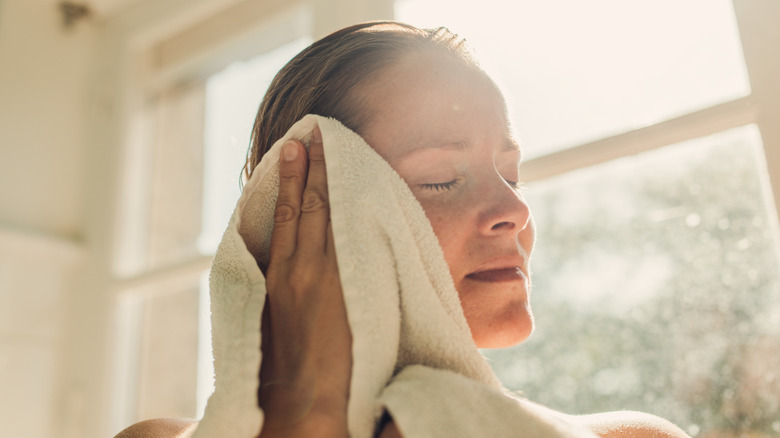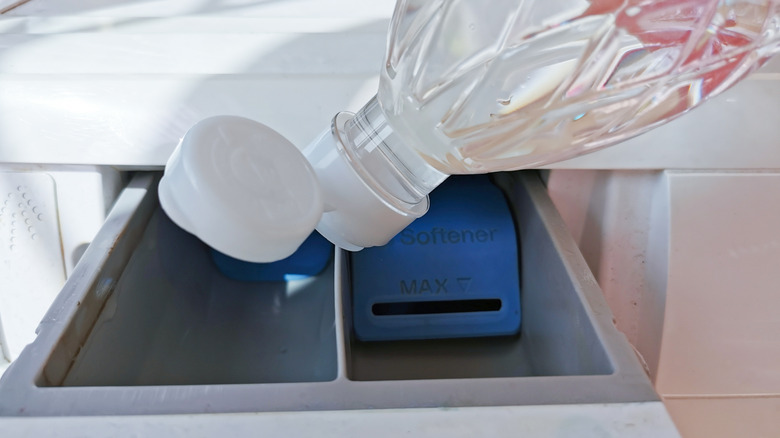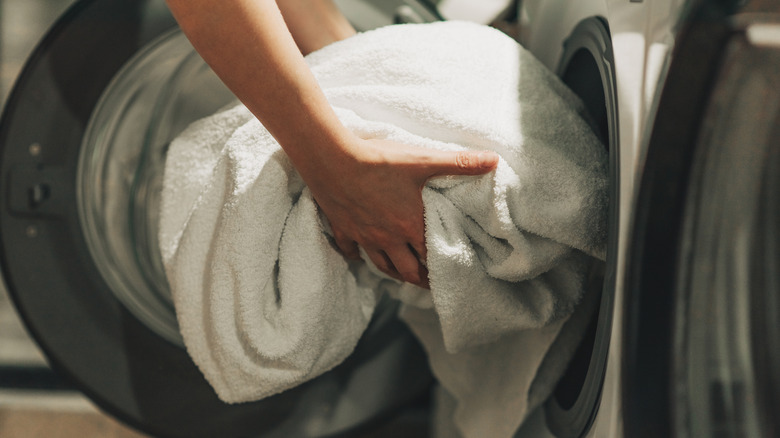The Cleaning Essential You Should Be Using For Soft & Clean Towels
For soft, clean scented linens, most people reach for their favorite fabric softener. But, did you know that fabric softener may be doing more harm than good to your clothes and towels? Traditional fabric softeners coat your items in a thin layer of chemicals that help produce that soft-to-the-touch feeling. However, those same chemicals can have negative effects on your towels and clothes. Patric Richardson of The Laundry Evangelist told the Martha Stewart blog that "Fabric softener is tough on fabric since it can take away its natural characteristics like breathability or wicking." Additionally, fabric softeners often leave behind a residue that causes the fabric fibers to break down quickly. Luckily, there's a far more natural and safe way to get soft, clean towels and it's with an item you probably already own — white distilled vinegar.
Vinegar is a versatile cleaning tool that can be used in various areas throughout your home. In addition to working like a natural fabric softener, vinegar is also an effective way to remove musty odors from your towels and can even brighten or remove stains from your towels when used correctly. That said, knowing when and how much vinegar to use for your towels will be crucial to your success here.
How to wash towels with vinegar
One of the first things you need to know about using vinegar in your laundry is that you should never mix vinegar with your regular detergent, as the vinegar can reduce the effectiveness of the soap and may even cause damage to your fabrics when the two are combined. With that in mind, all you need to get started is a load of towels, a washing machine, and roughly half a cup of distilled white vinegar. Avoid using other types of vinegar such as apple cider or red wine vinegar as these alternatives may stain your towels.
Add the vinegar to the fabric softener compartment of your laundry machine. If your machine doesn't have this feature, you can pour the vinegar directly into the machine's drum after the cycle has begun. Wash the towels in a warm setting with no detergent and let the machine do its thing. After the cycle is complete, you can choose to run the towels through once more, this time adding half a cup of baking soda instead of vinegar; however, this step isn't necessary unless your towels are particularly musty or stained. Once the washing is complete, throw your towels immediately into the dryer to avoid any chance of mildew.
So why does this method work? Well, vinegar is a natural ingredient that won't leave behind a chemical residue on your clothes. Additionally, vinegar excels at removing chemical build-up and residue left behind from laundry detergent and traditional fabric softener, which make your towels feel stiff. As a bonus, vinegar can also reduce static in your towels.
When not to use vinegar in your washing machine
While the vinegar method is effective at softening your towels and restoring some of their original fluffiness, it is not suitable for regular use. Because vinegar is so acidic, using it regularly in your washing machine can cause damage to the machine's hoses and seals, eventually leading to leaks. Instead, use vinegar as a towel fabric softener about once a month.
Other instances where it is not advised to use vinegar in the wash include when you're washing towels or clothing with elastic. Over time, the acid in vinegar can cause the elastic to lose its stretch. Mixing vinegar with bleach is also a no-no as these two together will create a harmful chemical reaction. General tips for the washing machine also apply when washing towels with vinegar. For example, you should always avoid overcrowding the machine. Filling your machine too much means that your towels and other items won't get as clean and may even result in bad odors.


